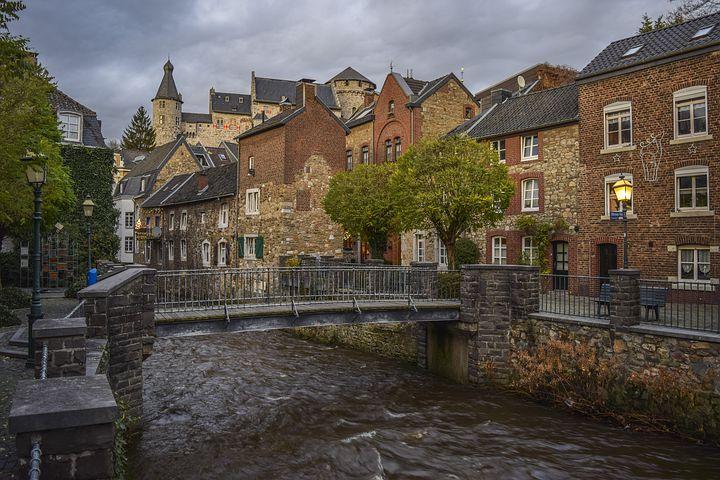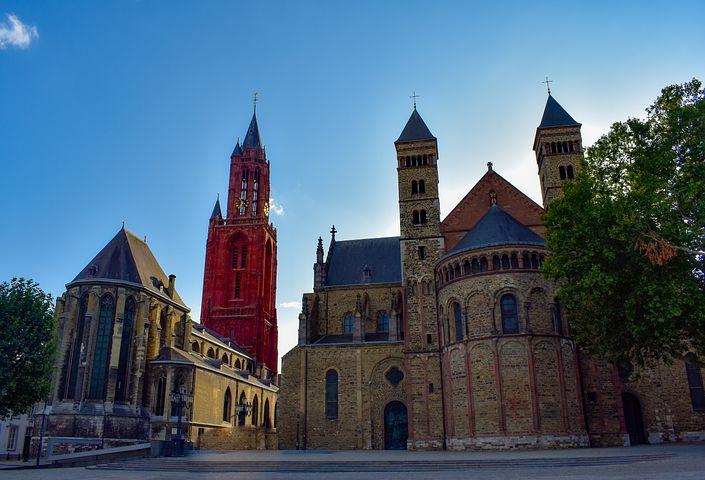Welkom, Bienvenue and Willkommen – great plaisire to heb you here! If you are not yet fluent in your new home’s language – no need to worry, go on and language will come your way. English is widely spoken among younger people (Germany and Belgium) or among just about everyone (Netherlands). Yet also a mishmash of common expressions and body language goes along way in the effort to communicate.
Regarding the great language diversity in close proximity, it is no wonder that the only ever official territory with Esperanto as its official language was the semi-state Neutral-Moresnet, right next to the tri-border point (disputed between Germany, the Netherlands, and later Belgium, with indipendent legislation and several privileges, existing between 1816-1919).
Some reasons for getting started
English is widely spoken, especially in the Dutch part of your new region. But learning the respective local languages will add to your social experience, your intercultural learning. It will also expand new opportunities in finding a job and pursuing an (academic) career. Your daily life will most likely confront you with either Dutch (Flemish, Limburgish), French or German. If you struggle to understand local dialects, head to the bottom of this page.
Getting started
This page serves as your starting point to go learn or improve a language. For self-study, find a lot of material below. For courses, you easily find private or semi-public providers such as Spraachen. Note that there is also public services that have a diversified offer in euregional and other languages – such as the Volkshochschulen in Germany (German only), libraries and taalcafés (Dutch only) in the Netherlands, and Maison de Langues in Liège.
Learn with the locals
You can choose to learn Dutch, Flemish (and even Limburgish) as an international in Maastricht or Hasselt. You can also learn Dutch with “ordinary” euregional locals from Aachen or Liège – this can be a creative way to explore their region in a language new to the both of you. Whatever your preference, we collected a few sources for individual learning and group activities such as buddy programmes.
Throughout the Euregio Meuse-Rhine, but especially in German-speaking East-Belgium and the Aachen region, primary and secondary schools have the label of “Euregioprofilschulen“. They teach content and languages from the neighbouring countries and engage in exchange programmes across borders. Linguacluster provides standardised material on the Euregio Meuse-Rhine, its people, traditions, sights and languages – downloadable in DE/EN/FR/NL, free of charge.
Click here to "sing" along with the typical language spoken in your region:
German / Deutsch / Duits / Allemand
Beginners: Yes, German is among the harder languages. However when just starting out, grammar is not crucial. German also shares a lot of vocabulary with English – you can easily compare vocabulary by checking out the German version of our website.
Advanced: Don´t worry about making mistakes, and don’t get too caught up on articles. If you still have a hard time with native speakers, Dutch or Belgian neighbours from just about the border can relate to your struggles. Many people speak quite fluent German, althouhg less among the younger generation.
Tips & Tricks
- Vast collection of tips and tricks for learning German by deutschland.de in German and English
- Find not less than the “Complete guide to speaking German” by study-in-germany.de
- Vast collection on (free) online material by make-it-in-germany for learning German online
- BBC free material, from quick language facts to holiday vocabulary and advanced courses
- Language learning and “typically German” behaviour by Deutschlandlabor, e.g. the seperation of waste and how organised Germans are
- Language learning with free downloads on Euregional topics by Linguacluster
Background
- (Where) do I need to know German – and where to find the courses for me and my partner?
- Before or while you take the deep dive, read some testimonials about learning German from fellow sufferers.

Eins, zwei, drei - Start!
Empty filling words
As a first aid-kit, buy yourself some time with empty filling words. These terms will buy you time for building complicated grammatical structures.
- Also
- naja
- mmh
- achso
Learn from native speakers, these words will make you sound authentic. Most importantly, they give your mind a little break without dropping out of conversation.
Authentic pronounciation
If learning words takes to long, you can improve your pronunciation. Whenever a word ends on “-er”, do not pronounce it as “-er”. Just give it an „-a:“, a kind of glottal stop. This will make your German sound much more natural.
Internationalims, improvising German
If you do want to invest only little in learning German expressions, go freestyle. Hopefully, your expression is in accordance with the many Germanic routes of English
- Exchanging an „s“ for a „t“ helps improvise many German words (Wasser, besser)
- Exchanging an „f“ for a „p“ (Apfel, hoffen (to hope))
- Note the many similarities: Great – Groß; State – Staat; Room – Raum and endless more
French / Francais / Französisch / Frans
Beginners: If you dare to explore but do not yet trust your French too much, in places like Gemmenich and Plombières you have great chances to find natives that understand you in whatever language. In Gemmenich, right next to tri-country point, people also share a unique dialect – French, German, Limburgish and Flemish, the right mix in the middle of the Euregio!
Advanced: If you master more of this language, you are ready for high level negotiations at “la Batte”. This place is one of Europe´s largest, weekly flea market on the banks of the Meuse river. For more information about the Euregio Meuse-Rhine in French, find free downloads on forty Euregional topics by Linguacluster.

Allez!
Empty filling words
No matter your level, employ empty filling words that will buy you time whenever you are looking for a word. Find more hints on words like:
- alors
- bah oui
- tu vois
- bon
- donc
Authentic pronounciation
If learning words takes to much effort, you can invest in sounding more authentic with the expressions you actually know. Find six tips from “easy French”
International vocabulary
If you do want to learn some French expressions, go with those that the Norman invaders exported to the British Isles (about 30%). As a rule of the thumb, everything that sounds „fancy“ or “adorable” has roots in French. All words on the following endings can serve as easy jokers:
– tion (information, acceleration, attention)
– ssion (mission, passion)
– able (admirable, capable)
– isme (racisme)
– ive (creative)
Une langue adorable
To compare both languages in a full sentence:
- “We hope that the information in this section “benefits” your passion and capability for creative language learning”
- “Nous esperons que les informations dans cette section vont bénéfiter votre passion et capabilité pour creativement apprendres les langues.”

Dutch / Nederlands / Niederländisch / Néerlandais
350.000 Belgians learn Dutch as a foreign language. Expat Centre Limburg has collected vast material on learning Dutch. Among the more than 35.000 Germans that learn Dutch, many live close to the border, where you can even take this language to the A-Level.
Beginners: Some Dutch vocabulary and sentence constructions can be recognisable for native English speakers. However, it can be frustrating that due to English being widely spoken, practicing your Dutch can become difficult. In the worst case, pretend that you do not know any English has prooved helpful to some. But never forget about the great potential of English-speaking job opportunities especially in the Netherlands!
Advanced: You might find that people from Belgian Limburg are more prone to speak Dutch with you. Of course you have the chance to choose from television, online and radio programming in both countries. Last but not least, around Aachen and in Maastricht, you have good chances to practice your Dutch also among non-native speakers, this might take some of the pressure of speaking perfectly.
One of the youRegion partners, Expat Centre Limburg has collected vast material on learning Dutch. Among the more than 35,000 Germans that learn Dutch, many live close to the border, where you can even take this language to the A-Level.
Prima!
Two ways of speaking Dutch in two countries
Flemish: The Belgian language situation can be confusing. Find some orientation by “International House Leuven” on which language among Flemish, French, German or simply English would be your appropriate choice for an extra language in Belgiume.
Dutch in Belgium tends to be perceived as closer to what is written. Pronounciation tends to have quite a high pressure and preciseness, so that barely any letter is missed, except for the „g“ and „ch“. In Belgium, this sound from the throath nearly dissappears, whereas it is highly recognisable in the Netherlands.
Hollands: Dutch in the Netherlands tends to sound more „American“, not least as the „r“ is increasinly “rolling”. Unlike in Flanders, Holland Dutch pronounce a “s” as something between “s” and “sh”. The letters „g“ and „ch“ are the most outstanding sounds, as they go deep to the throath. In the Euregion however, as throughout the southern Netherlands, dialects (Limburgish) are still widely used and „soften“ the influences of Hollands standard language.
Empty filling words
They buy you time to think, keep you in the conversation and give your speech an authentic feel
- Zeg maar (so to say)
- Nou (so)
- allemaal, helemaal (original meaning close to “alltogether”)
- toch (isn’t it)
Authentic pronounciation
When reading words, these few simple rules will enable you to pronounce quite everything.
- “g” and “ch” come right from the throat, very softly or very strongly (cf. “Maastricht”)
- “oe” is what “u” is in German
- “u” is what “ü” is in German
- “sch” is not “sh” as in German, but something between “sr” and “shr”
- “Z” sounds like a bee
- “ui” sounds like “ou” in “house”
Internationalisms, simple vocabulary
Good news if you already master English and/or even German, Dutch shares a lot with those languages. Chances for success with language improvisation are good!
- Wereld (world, Welt)
- Huis (house, Haus)
- Zon (Sun, Sonne)
Öcher, Dürener and other "Platt"
Limburgish is very close to the dialects spoken in South Limburg, Kölsch (Colognish) and Öcher (Aachen dialect, links by “Oecher-platt.de”). Commonly, they are also famous for a melodic sound. People from this area do not only “sing”, but are also said to be good in carpe diem, living the very moment without too many sorrows. That is why, unlike standard German, the „Rhenish Gerundium“ expresses everything going on at the very moment with a special form. As people with some Rhenish origins have contributed, please bear with us when using the English „-ing“ Gerundium a little too often on the headlines of this website.
If you want to get an impression of this language variation, carnival music (mostly from Cologne) will give you good access. Look for some of the (hundreds!) evergreens such as most famous “Et Trömmelche” and “Viva Colonia” (both carnival), or “Kölschrock” with “Verdamp lang her” or the hit on diversity “Mir sin ejns“. You can heart this kind of music in Dutch Limburg, especially during carnival with its ressembling traditions.
With great thanks to Dieter Schmitz, find pieces from his book “Oma Jertrud & Opa Hermann” (link for online-shop) and the authentic “Oma Jertrud – Schmunzelgeschichten aus dem Rheinland”. A humorous mixture of standard language and dialect and grandma’s wisdom for everyday situations.
Euregional travel before Schengen
Mein Opa und meine Oma wurden auf ihre alten Tage zu eifrigen England-Reisenden: mit dem Zug bis Ostende (Belgien) und auf die Fähre nach Dover.
Solche Reisen glichen immer generalstabsmäßig geplanten Expeditionen. Mein Opa begann mindestens drei Tage vor der Abfahrt damit, Pässe und Fahrkarten bereitzulegen. Unterhosen wurden abgezählt und gebügelt im Koffer verstaut. Der Arzt wurde konsultiert, ob alle Impfungen noch wirksam seien. Für die Reiseapotheke wurden Spalt-Tabletten, Abführmittel und eine Vorratsflasche “4711” [Parfüm aus Köln] gekauft. Mein Opa kontrollierte im Sechs-Stunden-Takt auf den Fahrplänen vom Reisebüro die Abfahrts- und Ankunftszeiten von Zügen und Fähren, was durch unterschiedliche Ortszeiten ins unermesslich Komplizierte gesteigert wurde.
“Bes dauch net ‘e su iggelisch!”, mahnte dann meine Oma zur Ruhe. Vergebens! [Sei nicht so ungeduldig/nervig]
Die Brötchen wurden ab- und die Lokalzeitung umbestellt. Der Kühlschrank abgetaut. Dann konnte es endlich losgehen. Kurz vor der Abfahrt erfolgte eine letzte Befragung: ob auch an alles gedacht und nichts vergessen worden sei?! Herd aus? Fernseher ausjesteckt? Telefon abjestellt?
Endlich saßen Opa und Oma im Zug, zusammen mit zwei schweren Koffern und einer Tasche mit Reiseproviant, der für drei Wochen gereicht hätte. Kurz nach Aachen erschien dann ein belgischer Zöllner im Zugabteil und wollte die Pässe sehen. Mein Opa suchte in seiner Manteltasche, dann in seiner Rocktasche, schließlich in allen Reisetaschen.
“Ja häste denge Pass net bej disch?”, ärgerte sich meine Oma, was selten genug vorkam. [Ja hast du deinen Pass nicht bei dir?]
“Eh-nee,” musste mein Opa kleinlaut gestehen, “der litt doheim om Fenste’brett parat!” – [Eh-nein […] der liegt zu Hause auf dem Fensterbrett bereit]
“Jo, da litt he joot!”, meinte meine Oma. [Ja, da liegt er gut!]
Solche Eskapaden kamen auf ihren Reisen öfters vor.
Excerpt from “Oma Jertrud & Opa Hermann” by Dieter Schmitz
Weather conditions
Opa Hermann kannte sich in der Weltpolitik aus, Oma Jertrud sich mit Menschen. So ergänzten sie sich irgendwie. Sie saßen oft auf der Bank im Hof und unterhielten sich über Jott und die Welt: Opa pfiff dabei seine Liedchen und drehte Däumchen vor seinem dicken Bauch. Und meinte dann zum Beispiel:
“Isch jlöv et widd
düüster.” [Ich glaube es wird dunkel]
“Meens’ de et?” [Meinst du das?]
Dann pfiff Opa ein
Viertelstündchen weiter.
“Is et disch net kaalt,
Oma?” [Ist dir nicht kalt, Oma]
“Isch weeß et net.” [Ich weiß es nicht]
“Wie – isch weeß et net?” [Wie – ich weiß es nicht?]
“Saare’ me: Nee.” [Sagen wir: Nein]
Zehn Minuten später
meldete sich Opa wieder zu Wort:
“Lott me renn jonn!” [Lass uns ins Haus gehen!]
“Häste att Honger?” [Hast du schon Hunger?]
“Och… net ombedenk’….” [Ach, nicht unbedingt]
“Do lott me nauch jett
waade…” [Dann lass mich noch etwas warten]
“Isch könnt ävver att jett äeße….” [ihr könnt aber schon etwas essen]
“Jo, do lott me renn jonn.” [Ja, lass uns rein gehen]
Kann es bei den gekrönten Häuptern aus den Grimm’schen Märchen romantischer zugegangen sein? Schwer vorstellbar.
Excerpt from “Oma Jertrud & Opa Hermann” by Dieter Schmitz
The sweet escape
Die erste Frage von uns Kindern nach Schokolade wurde meist abgeschmettert: “Nee, Jong, höck net!” [Nein, heute nicht] Minuten später durfte man den zweiten Versuch machen.
“Oma, biste sicher, dat du kein Schokolad’ mehr has’? Jaaanz sicher?”
Dann gab sich Oma den Eindruck, angestrengt nachzudenken. “Isch weeß et mäh net. Am Eng hann isch eres noch im Schaaf…? Isch möht ens luhre jonn?” [Ich weiß es nicht ganz. Am Ende habe ich vielleicht doch noch etwas im Schrank…? ….ich müsste mal gucken gehen. Müsste, sagte sie! Besser zu verstehen als: könnte. Denn tatsächlich gucken zu gehen, fiel ihr zu diesem Zeitpunkt noch nicht ein. Sie tat alles mögliche: Wäsche bügeln, Gläser spülen, Teppichfransen kämmen, auf ihrem Stuhl sitzen und durchs Fenster gucken …. aber auf keinen Fall in irgendwelchen Schränken nachsuchen. Sie erweckte Hoffnungen und ließ uns zappeln. Es war zum wahnsinnig werden. Der Schokoladen-Heißhunger verursachte bereits erste Entzugserscheinungen.
“Oma, wat liescht denn da drüben….?”
Unsere Oma hatte die Gabe, ihre Schokolade so auffällig unauffällig zu verstecken, dass sie einem geradezu ins Auge springen musste. Zum Beispiel unter einem Deckchen auf der Anrichte. Das Deckchen warf Beulen, als würde sich ein Hamster drunter verstecken. Und wenn man Oma auf die “Fundorte” längst verloren geglaubter Schokolade hinwies, spielte sie die Verdutzte:
“Och… Luhr disch dat ens aa’! Jlövste hee litt nauch e’ Stöckelsche he’röm??” [Ach… guck sich das mal einer an! Glaubst du es, hier liegt noch ein Stückchen herum??]
Sie langte unter das Deckchen und holte eine angebrochene Tafel hervor – und brachte damit Kinderaugen zum Leuchten. Die zarteste Versuchung seit es Großmütter gibt! Meine Oma brach sich ein Stückchen Schokolade ab und schob es sich genießerisch in den Mund. Und als wäre diese Frage nötig gewesen, meinte sie: “Jong, willste och e’ Stöckelsche hann?” Ein eiliges, zustimmendes Nicken – und dann war man endlich am Ziel seiner Träume angelangt: EIN Stückchen Schokolade.
Excerpt from “Oma Jertrud & Opa Hermann” by Dieter Schmitz
